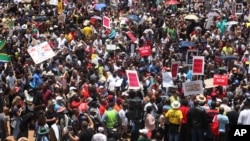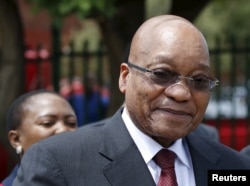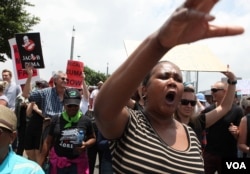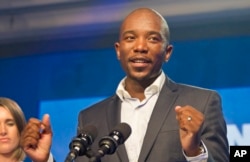The thousands of protesters who recently thronged the streets of three major South African cities to demand the president’s resignation set off international alarm bells that the end was nigh for the increasingly unpopular President Jacob Zuma and his cadres.
After all, this relatively small set of protests managed to bump South Africa’s reigning Twitter topic to second place -- media monitoring company ROi Africa noted that the mid-December call that #ZumaMustFall unseated murder-convicted Paralympian Oscar Pistorius in local social media.
It has clearly been a rough year for South African politics, when political machinations -- most recently, Zuma’s decision to run through three finance ministers in a week -- manage to trump a lengthy, high-profile murder case splattered with sex, sports and celebrity.
But is it enough to break the back of Africa’s stablest and most enduring democracy? Or is this just business as usual in the continent’s most raucous and advanced political system?
Many South African commentators were quick to call this event the last straw, the veritable crossing of the Rubicon from the Rainbow Nation to the Ruined Nation.
Other scandals
This follows continuing scandals around Zuma’s alleged use of government funds to upgrade his private home; persistent failures by the state-run electricity provider; attention-grabbing student protests over fee hikes and ongoing malaise over alleged corruption and maladministration by the ruling African National Congress.
“Simply put, this has got to be Zuma’s final straw,” journalist and commentator Alex Eliseev said. “The final insult to a battered nation. The last laugh of a man who does not care about the people he leads.”
"This is the final straw,” agreed ANC stalwart Barbara Hogan, in a rare instance of the famously disciplined ruling party breaking ranks with its leader. “If the president is now intent on dismantling Treasury, anyone who has been in government knows that a lot of government revolves around a treasury."
But the “last straw” argument is wearing admittedly thin in the Rainbow Nation -- and has long been something of a personal millstone around Zuma’s neck.
"It's the end of him, at least politically," William Gumede, an author and political analyst, said about Zuma once. "This was kind of the last straw."
Gumede said that a decade ago, when the then-deputy president was tried for and acquitted of rape charges.
Since becoming president in 2009, Zuma has weathered -- and come out unscathed -- from countless opposition attempts to impeach him, thanks to the ANC’s solid parliamentary majority.
The opposition has repeatedly raised the issue of impeachment, most recently around Zuma’s decision to allow Sudanese President Omar al-Bashir to visit South Africa without arresting him on an international war crimes warrant.
Last straw
That episode, in June, was the straw that opposition leader Mmusi Maimane said broke the camel’s back.
"You, Honorable President, are not an honorable man,” Maimane said, looking directly at a smiling and impassive Zuma in parliamentary chambers. “You are a broken man, presiding over a broken society. You are willing to break every democratic institution to try and fix the legal predicament you find yourself in. You are willing to break this Parliament if it means escaping accountability for the wrongs you have done.”
'What nonsense'
However, commentator Max du Preez says all this shows is South Africans’ predilection for over-the-top rhetoric -- though he agreed that the many political scandals of 2015 may have finally broken the ANC’s hegemony and Zuma’s hold over the country.
“What nonsense,” du Preez wrote in local media. “If we want to survive 2016 in one piece, we will have to cast off this paralyzing, dark pessimism. It’s going to be a rough year with many social and political upheavals and much economic suffering, but South Africa and its people still stand on a firm foundation that would be able to weather much more serious storms.”
So as 2016 dawns in South Africa, who’s right: the pessimists who think that the camel’s back is broken, or the optimists? One thing is clear: as local elections approach in mid-2016, this debate will rage on.







